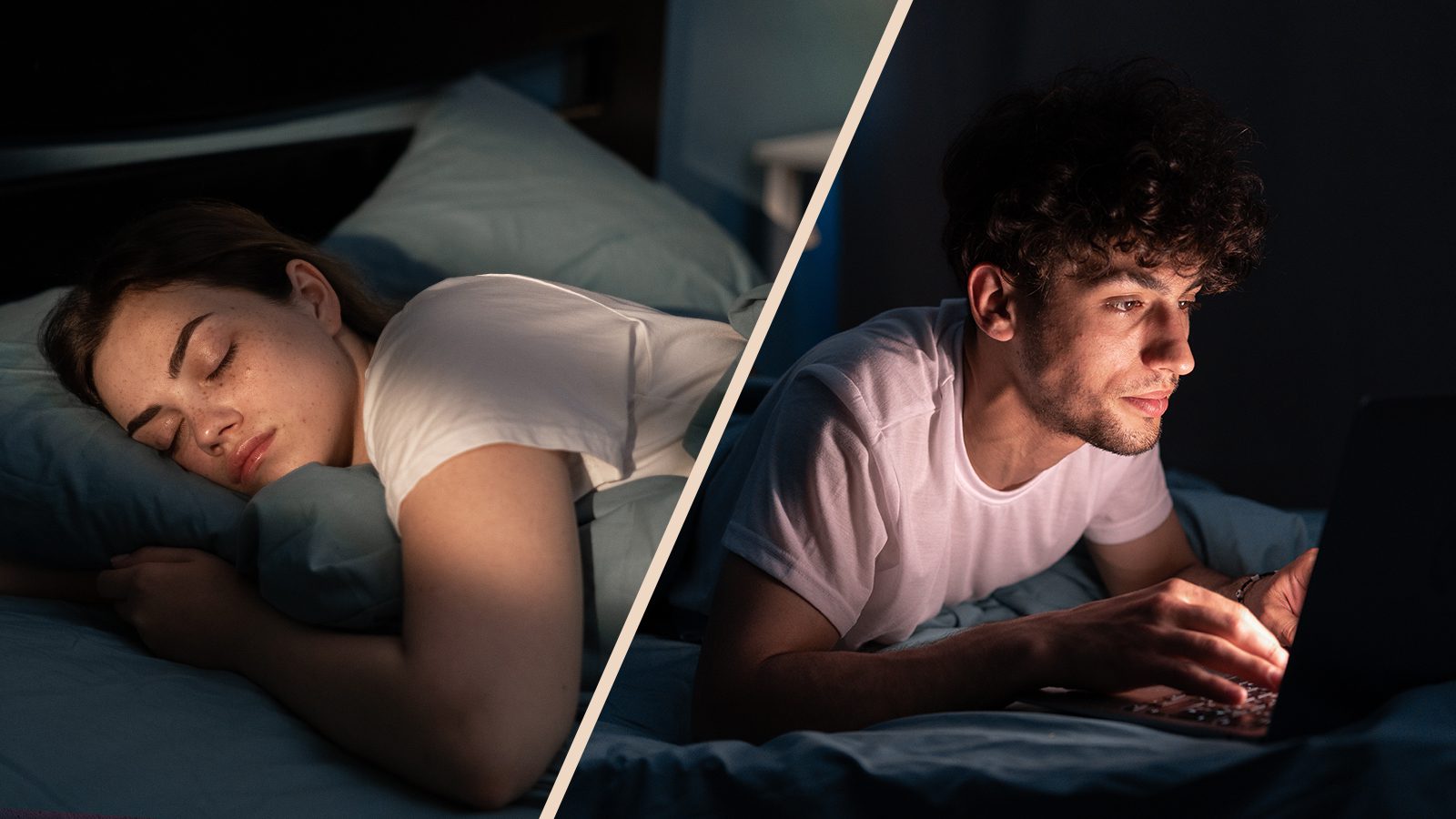Here’s how Zoomers can get more sleep.
A good night’s sleep – it’s a pursuit that, across generations, Americans are constantly chasing after. But what does it take to find that peaceful slumber? A recent poll reveals that thinking about one’s favorite moments from the day, time spent with family, or even reflecting on work could be the keys. However, bedtime routines and what leads to that peaceful night differ remarkably across generations.
Based on a survey conducted by OnePoll for Serta Simmons Bedding, involving 2,000 U.S. adults evenly distributed across generations, some surprising findings came to light. The data challenges some commonly held beliefs and provides insights into the bedtime habits of Baby Boomers, Gen X, Millennials, and Gen Z.
Dwelling on the Day: A Surprising Insight into Sleep Habits
The popular belief that contemplating work before bedtime might disrupt sleep is a myth. The research indicates that reflecting on one’s career before sleep might enhance the quality of rest.
Interestingly, Millennials lead the pack, with 56% mulling over their favorite moments of the day. Gen X, however, is split with 39% reminiscing about their day, while another 38% focus on their career.
Generational Gaps in Sleep Behavior
There are distinct variances in how each generation prepares for bedtime. For instance, Gen Z shows an inclination towards prioritizing sleep, with 61% of the respondents emphasizing its importance. However, they appear to be the most relaxed about their nighttime routine. A notable 68% of Gen Z individuals often fall asleep with their phones still in hand. They’re also prone to drifting off without brushing their teeth (53%) or changing their daytime outfits (47%).
By contrast, Gen X, while preoccupied with thoughts of work, seems to have mastered the art of unplugging. A mere 25% of this generation doze off with their mobile phones by their side.

Gen Z Lacks Restful Rituals
The average individual dedicates an astounding 162 hours annually, or a little over 26 minutes daily, to their nighttime routine. This ritual varies significantly by generation. For instance, a bath or a shower is a part of the routine for 36% of Millennials, whereas only 19% of Gen Z feel the need for a comforting shower.
While 28% of Boomers find it essential to indulge in a movie or series before they drift to dreamland, just 19% of Gen Z feel the same. Gen Z’s predominant nighttime activities include the following:
- Turning on a fan (22%).
- Donning a sleep mask (21%)
- Journaling (20%).
- Reading (20%).
- Enjoying music (20%).
- Planning the next day (20%).
The commitment to these routines is also noteworthy. The younger generation, those between 18–26, are willing to shorten their morning routines (43%) rather than compromise on their bedtime ones.
Gen X (40%) and Boomers (39%) seem more amenable to shortening their nighttime rituals for a few more moments of sleep.
Night Owls, Early Birds, and Everything in Between
The classic division between early birds and night owls remains. According to the survey, 38% label themselves as early risers, while 22% identify more with the night owl tag. Interestingly, a third of the respondents see themselves fitting into both categories.
This division further correlates with geography. The Northeast is home to 41% of early birds, while the Southeast sees a dominant 33% of night owls.
In Pursuit of Quality Sleep
Suann Griffin of Serta Simmons Bedding comments:
“While generations may differ in their sleep and getting-ready-for-bed habits, creating and sticking to a consistent sleep routine can help people of any age improve their sleep quality.”
Rituals, from meditation to journaling and consistent sleep and wake times, can significantly boost sleep quality.
But what signifies a sound sleep?
For many, it’s uninterrupted slumber (41%) and waking up naturally before an alarm rings (33%). This could be good news since 29% of Americans claim they usually rise without the aid of an alarm.
A Bedtime Routine for Restful Sleep (Regardless of Generation!)
Regardless of your generation, optimizing your bedtime routine can increase the chances of high-quality slumber. Here are a few things to try:
Establishing a Consistent Sleep Schedule
A consistent routine is the cornerstone of a healthy sleep cycle. Regardless of the demands of work, social life, or household chores, it’s essential to maintain regular sleep and wake times. That helps to set our body’s internal clock. Therefore, it reduces the time it takes to fall asleep and ensuring a deeper, more restful sleep.
Even on weekends, try to keep the deviations minimal. A consistent rhythm can help mitigate fatigue and sleepiness throughout the day.
Following a Consistent Daily Wind-Down Ritual
The transition from the day’s hustle to a peaceful night’s sleep should be gradual. A wind-down ritual can help signal the body that it’s time to rest.
It could be calming activities like reading a book, listening to soft music, or practicing relaxation exercises. Such practices help the body and mind to dissociate from the day’s stressors, making it easier to drift into sleep.
Creating a Sleep-Inducing Environment
The ambiance of your bedroom plays a pivotal role in influencing sleep quality. A calm, dark, and quiet room is typically most conducive to sleep.
Consider investing in light-blocking curtains, earplugs, or a white noise machine to filter out disruptions. Additionally, investing in a cozy mattress and comfortable pillows can further optimize the sleeping environment.
Ensuring your bedroom feels like a dedicated space for rest rather than an extension of your workspace or living room can mentally prepare you for a restful night.
Limiting Screen Time
The blue light emitted from screens – smartphones, tablets, or televisions – can interfere with the production of the melatonin hormone.
As a result, it can push our sleep schedule out of sync. That’s what makes it challenging to fall asleep.
Ideally, avoiding screens for at least an hour before bedtime is beneficial. If this seems unfeasible, consider using screen filters or “night mode” settings that lower the blue light emissions.
Being Mindful of Diet and Exercise
What we consume and how we expend energy throughout the day can significantly impact our sleep. Consuming caffeine or large meals too close to bedtime can disrupt sleep.
On the other hand, regular exercise can support better sleep, helping you drift away faster and enjoy a deeper sleep. However, it’s best to avoid intense workouts too close to bedtime as it might have the opposite effect.
Mastery of Relaxation Techniques
Relaxation techniques – deep breathing exercises, meditation, or progressive muscle relaxation – can alleviate stress and induce a sense of calm.
Integrating these practices into your nighttime routine can reduce the mental clutter that often acts as a barrier to sleep.
Seeking Professional Guidance
If sleep remains elusive despite best efforts, it might be time to seek guidance from a sleep specialist.
Sleep disorders, like insomnia or sleep apnea, may indicate underlying causes that require professional attention. Addressing these issues can help you have a night of undisturbed sleep.
While our busy lives and varied backgrounds might make sleep seem like a luxury, it is, in fact, a necessity. Giving importance to our bedtime routines and habits means we can reclaim the restful nights our bodies and minds deserve.
Final Thoughts on the Sleep Habits of Gen-Z
Bedtime rituals and habits vary across generations. Still, the universal quest for quality sleep remains the same. Understanding the importance of a well-established bedtime routine might be the key to unlocking restful nights and more productive days.






















